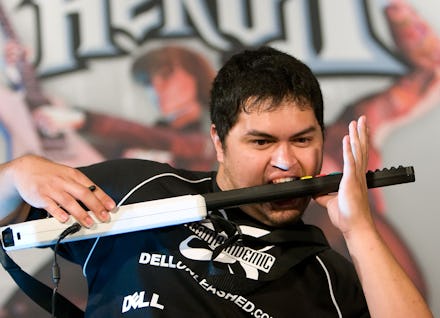All That 'Rock Band' You Played in College May Actually Have Made You a Better Musician

After a patch of relative silence, the company behind the Rock Band franchise has confirmed it will be releasing its fourth iteration this year. A new Guitar Hero likely won't be far behind. Once again, college dorm rooms across the country will ring out with classic rock, the clicking of plastic keys and endless swearing.
But before we all resume our button-mashing, it's worth asking: Were all those hours worth anything? Acing DragonForce's "Through the Fire and Flames" on Expert may have made us feel like rock gods, but did any of that actually help anyone become a better musician? As it turns out, a wide range of scientific research thinks it actually has.
The basics. According to several studies and surveys, music games provide rudimentary development of the same skills required to play real instruments, such as a sense of meter, pitch, inter-limb coordination, hand-eye coordination and dexterity. Rock Band's drums work the latter three skills especially hard and translate to real drumming easily, since the movements and coordination are essentially identical.
But Rock Band goes much deeper than simply mimicking the skills involved in real instruments. It also provides an invaluable starting point for teaching novice musicians how to respond to external metronomes, subdivide that metrical time and read rhythmic and melodic notation. Researchers out of Indiana University describe Rock Band's notation system as a "'training wheels' version of traditional notation." They found that as a group of elementary schoolers logged more Rock Band sessions, their overall scores on traditional music assessments trended up with significantly less variability. Their results suggest that once the kids internalized Rock Band's musical notation system, they were far better equipped to learn a second system — in this case, traditional musical notation.
A 2011 study performed by audio engineering professor Patrick Richardson, then a master's candidate at Drexel University, saw similar improvements. Richardson found that his experimental group of Guitar Hero and Rock Band players exhibited "significant improvement over time" in various sight-reading musical tests, while his control group showed no significant change. Richardson's sample size was too small to produce irrefutable statistical trends, but they do point towards some interesting conclusions.
Many of his participants reported that playing the game taught them to be far more capable music listeners. "The thing that the games have done well is an analytic listening skill development — studying, learning, even just rote memorization for its parts by inspection," Richardson told Mic. These cognitive aspects form an important foundation for genuine musicianship.
Motivating the next actual "Guitar Hero." The real power of Guitar Hero and Rock Band games may actually come from their ability to motivate kids to pick up a real instrument.
"Anyone who's learned to play a musical instrument knows that practice can feel like drudgery sometimes," John Davies, director of the Communications Research Center at Brigham Young University, told Mic. "But if you can get a game like Guitar Hero that can stimulate an interest in practice, then that's a good thing."
In a 2014 study, Davies and his student Timothy J. Hemingway looked at how gamers' fantasy-seeking motivations led to Guitar Hero motivating them to learn an instrument. They found that younger players who played Guitar Hero because being musical appealed to them were more likely to be motivated to play a real instrument than older players were. That willingness to practice is half the battle.
Rock Band and Guitar Hero won't immediately set you up for superstardom, but they do more for motivation and basic skills than most would ever expect. Welcome back, Rock Band. It's been too long.